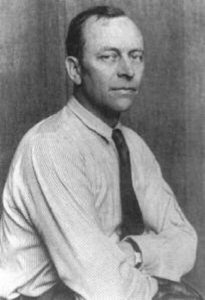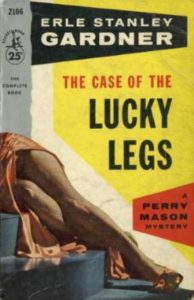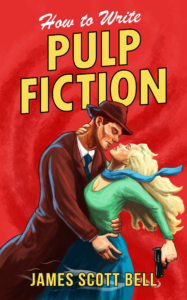by James Scott Bell
@jamesscottbell
Unless you’re writing literary fiction, where an expansive style is part of the experience (e.g., Thomas Wolfe), you should strive to write tight. You’re telling a story. Your goal is to draw readers into that story, fast, and keep them there. Every sentence should serve that purpose. Writing tight means no excessive prose, no over-padded paragraphs, nothing to get in the way of the fictive dream.
Now, this does not mean you can’t have what John D. MacDonald called “unobtrusive poetry” in the style. The key word is unobtrusive. It does its work pleasantly, then steps out of the way. Not this:
With sharp whetted hunger he thought of breakfast. He threw the sheet back cleanly, swung in an orbit to a sitting position and put his white somewhat phthisic feet on the floor. (Look Homeward, Angel by Thomas Wolfe)
Eh? What? Is that a typo? Phthisic? What the heck is that? (It’s actually a word. You can look it up. Which is not a good way to write, sending readers to the dang dictionary!)
Instead, this:
The sun that brief December day shone weakly through the west-facing window of Garrett Kingsley’s office. It made a thin yellow oblong splash on his Persian carpet and gave up. (Pale Kings and Princes by Robert B. Parker)
So let’s look at some ways you can write tighter.
Cut Flab
In Stein on Writing, Sol Stein defined flab as “superfluous words and phrases.” Most flab comes in the form of adjectives and adverbs. Stein’s advice is to cut all the adjectives and adverbs in a manuscript, then readmit only “the necessary few after careful testing.”
As an example, I want to show you a sentence I read in a non-fiction article posted on a popular sports website. It had to do with NBA Mavericks owner Mark Cuban getting into hot water with the league (a habit with him):
Cuban felt the refs did his team dirty and ultimately blamed the officials for the Mavericks ultimately losing the game.
We’ll get to the repetition of the adverb ultimately in a moment. But first, does that word help this sentence in any way? No. It adds nothing but flab. How much stronger it is this way:
Cuban felt the refs did his team dirty and blamed the officials for the Mavericks losing the game.
And, of course, using that adverb twice in the same sentence is truly felonious. You need to watch for the same thing in your paragraphs, too. I call these…
Echoes
Take a look at this:
Max walked into the bar. It stank of beer and sweat. He spotted Henderson sitting at a table, alone. He walked over and stood there, arms folded. Henderson looked up. His eyes told Max he just wanted to be left alone.
The repetition of alone is an echo. While it doesn’t violate any rule of grammar, it is what I would call a little “speed bump” that momentarily takes the reader out of the scene. The repeated sound is jarring.
The solution is simple: cut one of them. You could do it this way:
Max walked into the bar. It stank of beer and sweat. He spotted Henderson sitting at a table. He walked over and stood there, arms folded. Henderson looked up. His eyes told Max he just wanted to be left alone.
Or this way:
Max walked into the bar. It stank of beer and sweat. He spotted Henderson sitting at a table, alone. He walked over and stood there, arms folded. Henderson looked up. His eyes told Max he didn’t want to talk to anybody.
The exception to this guideline is when you purposely want to emphasize a word, as in the following:
His shirt was black. His pants were black. His boots were even blacker, if that was possible. He looked like Johnny Cash at a funeral.
Dialogue
As I contend in my book on the subject, dialogue is the fastest way to improve a manuscript. An agent or editor, or reader for that matter, knows good dialogue because they’ve seen so much of the bad variety.
One of the marks of effective dialogue is compression. Unless there is a reason a character long winded, keep the dialogue tight and to the point.
The easiest way to do this is to cut words. You can almost always cut a word or two out of dialogue and make it sound better. Example:
“I don’t think this is a good idea,” Max said.
“Well then, what do you suggest we do?” Henderson said.
“I don’t know, drive around to the back maybe.”
“That would be a stupid thing to do.”
“Why do you say that?”
“Because that’s where all the cops will be.”
Can we tighten this up? I think we can:
“This isn’t a good idea,” Max said.
“What do you suggest?” Henderson said.
“Drive around the back maybe.”
“Stupid.”
“Why?”
“That’s where all the cops’ll be.”
Obviously you adjust according to the way your characters talk. But you will be amazed how much better your dialogue sounds when you trim the fat this way.
How would you describe your default writing style? When first drafting, do you tend to write long and cut? Or do you write lean and add?





